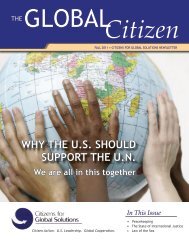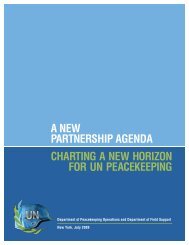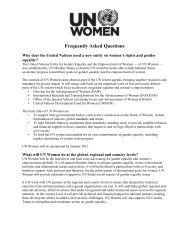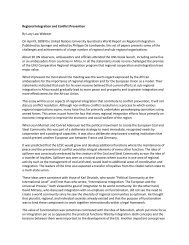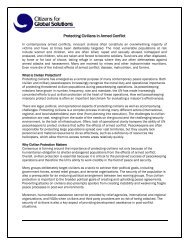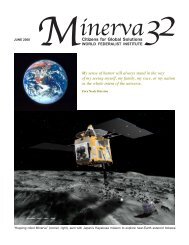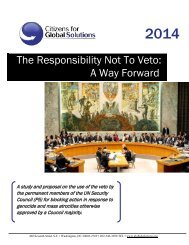Minerva, Fall 2011 - Citizens for Global Solutions
Minerva, Fall 2011 - Citizens for Global Solutions
Minerva, Fall 2011 - Citizens for Global Solutions
- No tags were found...
Create successful ePaper yourself
Turn your PDF publications into a flip-book with our unique Google optimized e-Paper software.
mentalism The first step <strong>for</strong> human rightsorganizations is to engage further withthat work. There are some areas in whichhuman rights organizations are alreadyconfronting fundamentalism and respondingto it, <strong>for</strong> example in the area of sexualand reproductive rights. But let’s face it:there are other areas. We have seen in ourwork there is a need <strong>for</strong> a far greater engagementof human rights organizationswith the question of family law, which thewomen’s movement has long considered.Many aspects of family law have beensubject to standard-setting <strong>for</strong> decades,so it’s not the absence of standards; it isreally a need to consider family laws asan area which the human rights communityshould engage with, and that is wherethey will encounter religious fundamentalismsre-ordering relationships with theself and intimate others.I’m not convinced that a project approachor rather saying that “we will now lookat religious fundamentalism” will work.What is needed is a far deeper consciousnessof religious fundamentalisms withinhuman rights organizations. For instance,working with staff, holding discussionsinternally, looking also at how in subtleways responses of human rights organizationsmight well be actually invoked byreligious fundamentalist groups themselves.We know that they use the humanrights language too; they understandhow to mobilize the language of rights,they understand how to capitalize on theawareness of rights, and the legal consciousnessassociated with it.I also think human rights groups need tounderstand their own moral and politicalpreferences when addressing humanrights questions and take into account howreligious fundamentalisms influence relationshipsin <strong>for</strong>mulating their responses.CB: I tend to agree with you that a projectfocus may not be the best way to go.On the other hand, women’s rights activists’experience of “mainstreaming” hasbeen quite a bitter experience in terms ofgender rights. If we say that we shouldmainstream awareness of religious fundamentalisms,how can we ensure that is notreduced to a one-line meaningless sentenceat the bottom of the analysis to theeffect that “Religious fundamentalismshave a role to play in this and need to betaken into account”. How can it becomesomething more profound?VN: Responding effectively to fundamentalismsrequires a sincere, detailedand in<strong>for</strong>med reflection on how individualautonomy and social relationships areconstructed in the world today. Those engagedin human rights work need to striveharder to understand the nuanced political,social realities that shape interactionsbetween individuals within families,within communities, societies and evennations and states. It’s not just a questionof having some workshops on religiousfundamentalisms <strong>for</strong> example. It’s aboutreflecting deeply on what kinds of <strong>for</strong>cesin different social contexts shape individualand social relations.CB: You seem to be quite com<strong>for</strong>tablewith the term, and yet within certain sectorsof the human rights community thereis a level of discom<strong>for</strong>t with using theterm “religious fundamentalisms”. Canyou explain why you feel com<strong>for</strong>tableas a human rights activist with using theterm?VN: Maybe it’s because coming fromSouth Asia I understand almost intuitivelywhat this means and others who comefrom other contexts may understand itless so. However, I also think that it’s becauseI don’t rely on international humanrights <strong>for</strong> my political direction. I see internationalhuman rights as an extremelyimportant framework that can define relationshipsbetween people, between statesand between states and people. Thatdoesn’t mean I have an instrumental viewof human rights: I think human rights valuesare an end in themselves, but at thesame time we need something more.I am also com<strong>for</strong>table with the term becausethose of us who are engaged in reflectionon how to change the world welive in <strong>for</strong> the better, must be prepared toreflect on every aspect that influences theway we want to change it, including religion.CB: Research into strategies <strong>for</strong> resistingand challenging religious fundamentals38 • <strong>Minerva</strong> #39 • November <strong>2011</strong>has questioned the utility of labelling individualsand pointing a finger: “That isa fundamentalist”. There are indicationsthat a more effective way of approachingthis would be to label agendas — recognizingthat at times it can also be strategicto unmask a specific individual — a politician<strong>for</strong> example. This is both becausefocusing on agendas not individuals canbe more likely to help build alliances,and because in some countries there maybe actors who pursue a fundamentalistagenda but who outwardly appear secularor they’re operating within a secularframework. So to start labelling them “religiousfundamentalists” creates problemsof taxonomy and debates over definitions,losing sight of the impact of what they do.Is that something that you can relate to inyour work as a human rights activist?VN: We all probably agree more or lessthat when we challenge key individualswe are challenging what they stand <strong>for</strong>and represent — the agendas they translateinto action. Eventually we have tofocus on agendas at some level… I’m justafraid that — to paraphrase Victor Hugo— religious fundamentalisms are an ideawhose time has come and we won’t beseeing the end of its influence by focusingon some individuals; fundamentalismis something whose seeds have beenplanted and which needs a long, sustainedef<strong>for</strong>t at de-seeding. This means clearlyfocusing where necessary on individualsand eventually on the agendas too, seekingnot so much to de-legitimise “them”but on legitimising other more empowering,enabling ideas. This is where humanrights can be a very important idea, as acounter narrative, not an anti-narrative,that focuses on reclaiming agency. ïVijay Nagaraj



